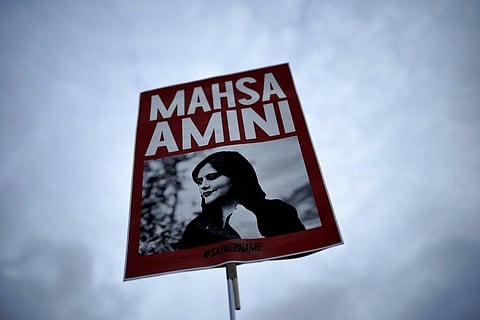

TEHRAN: Iranian campaigners arrested in a crackdown over protests sparked by the death of Mahsa Amini are at risk of being tortured or even dying behind bars, rights groups warn.
Amini, 22, died in September three days after her arrest by the morality police in Tehran for allegedly violating the Islamic republic's strict dress code, triggering protests that have been running for more than a month.
Shocking images emerged on Thursday of the arrest of freedom of expression activist Hossein Ronaghi who was put into a chokehold and hauled away when he presented himself at a prosecutors' office. Since his arrest on September 24, he has been held in Tehran's Evin prison and his family says he risks dying due to a kidney condition. They also say his legs have been broken.
Ronaghi is just one of several prominent rights activists, journalists and lawyers who have been arrested and who supporters fear may never emerge alive from the notorious facility, where most political detainees are held.
A fire at Evin on October 15 killed eight inmates, according to authorities.
It only amplified concerns about prisoners' welfare, with activists accusing authorities of firing tear gas and metal pellets inside the jail, even if none of the political prisoners were reported to have been harmed.
"Detainees who are often forcibly disappeared are at serious risk of torture and death. Urgent action by the international community is crucial at this point," said Mahmood Amiry-Moghaddam, director of the Oslo-based group Iran Human Rights.
IHR said thousands had been arrested nationwide in the crackdown, including at least 36 journalists, 170 students, 14 lawyers and more than 580 civil society activists, including workers and teaching union officials.
READ | Family rejects official Iran findings on Mahsa Amini's death: Lawyer
'Could barely speak'
Roya Boroumand, director of the Washington-based Abdorrahman Boroumand Center, said the situation was compounded by the sheer number of new prisoners being brought to jails including Evin and the Fashafouyeh Greater Tehran prison.
"We are very concerned about the treatment of detainees," she told AFP.
Overcrowding means there is "no choice but to sit or sleep in turn" in areas including prison gyms.
Analysts say the mass arrests are a key strategy under Ayatollah Ali Khamenei in seeking to combat the nationwide wave of protests, which represent one of the biggest challenges to Iran's Islamic system since the 1979 revolution.
Ronaghi, a contributor to the Wall Street Journal, has for years been one of the most fearless critics of the Islamic republic still living in the country. Security forces made the first attempt to arrest him on September 22 while he was giving a live interview to Iran International TV but he managed to slip out of his apartment, he said at the time.
He came out of hiding two days later but was immediately arrested along with his lawyers.
After the fire that ripped through the jail, Ronaghi "had a short call with my mother but could only say a few words and could barely speak" due to his ill health, his brother Hassan Ronaghi wrote on Twitter. "Hossein's life is in danger," Hassan wrote in his latest tweet on Wednesday.
After the Evin fire, Amnesty International urged access for independent monitors "to protect prisoners from further unlawful killings, torture and other ill-treatment".
'Severely beaten'
Activist Majid Tavakoli, who has been repeatedly imprisoned in Iran in recent years, including after the disputed 2009 elections, remains in jail after his arrest on September 23. His family says they have had no news of him since the fire. "Why can't a person be free whose only tool is his brain? Is thinking a crime?" his wife tweeted.
Arash Sadeghi was only released from prison after serving several years last May. He was jailed in Evin on October 12, despite suffering from chondrosarcoma, a rare type of bone cancer. His father tweeted a picture of a dozen boxes of medicine he needs. "You can imprison his body but his soul is always with the people and the prisoners he does not know," he wrote.
IHR expressed concern that several activists were still incommunicado behind bars, including the journalist and campaigner Golrokh Iraee and prominent tech blogger Amir Emad Mirmirani, known as Jadi. The rights group said some detainees had given "self-incriminating televised confessions under duress and torture" and had also been subjected to verbal insults while in custody.
Prisoners have "testified to being severely beaten, tortured during interrogations, and deprived of food and clean drinking water," Boroumand said.
"Detainees are left with shotgun pellets and broken limbs (and) without medical care."
READ | Who is leading the crackdown on Iran's protests?